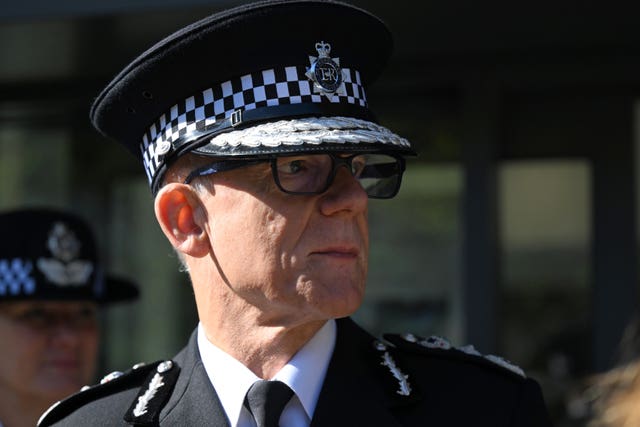By James Simons-
Met Police Commissioner , Sir Mark Rowley has called for pay rises for officers following a survey that shows hundreds of police officers are turning to food banks during the cost-of-living crisis.
Sir Mark Rowley was reacting to the shocking survey by Metfriendly, a financial service for Met staff, which found 86% of officers and staff had financial concerns.
Hundreds of those surveyed say they had missed meals due to lack of money- an indication that pay wage packets for police officers are insufficient.
The revelation that a high percentage of police officers in the Uk cannot afford three square meals comes as a blow to the government that hires them .
“I am certain that pay is a key factor,” Sir Mark said.
Sir Mark re-iterated calls for a pay rise for police officers that is in line with inflation.
The Met is the UK’s largest police service and currently employs more than 43,000 officers and staff.
Metfriendly surveyed more than 3,000 serving police officers and staff and found most are in a worse position than they were six months ago.
Results showed 27% of respondents admitted to missing meals, while 8% admitted to using a food bank to support themselves.
Reacting to the findings, Sir Mark said: “It cannot be right that police officers, the people who society turn to when they are most in need, are themselves turning to food banks, getting into unsustainable debt and choosing not to eat so they can pay their bills.”
Metfriendly said of those surveyed, 60% were doing more overtime, 26% had a second job and 40% were selling their possessions.
Just over a third (37%) were considering leaving the police force altogether, Metfriendly said.
“Frontline officers have seen their salaries fall by around 17% in real terms over a decade,” Sir Mark explained.
“This report lays bare the very real impact that is having in the context of the cost of living crisis and the urgent need to address it.”
March this year, independent research by a non-partisan organisation, Social Market Foundation (SMF), found that real terms police pay has fallen almost 20 per cent behind inflation between 2000 and 2022.
Police Federation of England Wales national chair Steve Hartshorn says the Government “must realise that by ignoring police officers, it is ignoring the safety of members of the public”.
“Police officers also have bills and rent to pay,” he said. “The Government cannot maintain the view that officers will somehow continue to manage putting their lives at risk every day when they cannot afford to live.
“To mirror the words of the Government, police officer pay must be ‘fair’, at the moment it is far from that.”
Mr Hartshorn said there is little doubt that, for decades, police officers in England and Wales have been the “poor relation of the emergency services for successive governments”.
“More recently, it was in 2021 when the Government subjected police officers to a pay freeze making them the only group of emergency service workers to not receive a pay rise,” he said.
“This is at the same time as requiring police officers to enforce government-imposed restrictions on members of the public while they are also facing increasing levels of assaults.
“The suggestion [in media reports] of a derisory six per cent in the current climate, when independent research has shown that officers have suffered an almost 20 per cent pay cut over the last decade, is jarring.”
According to the latest data released by the Office for National Statistics (ONS), core inflation (CPI), which excludes energy and food prices, rose by 6.8 per cent in the 12 months to April 2023, up from 6.2 per cent in March this year and making it the highest rate since March 1992. Whereas core CPIH, which is CPI including owner occupiers’ housing costs, excluding energy and food prices, increased from 6.2 per cent in April 2023 to 6.5 per cent in May this year, making it the highest rate since November 1991, when it was also 6.5 per cent.
The Police Family Finance Index, undertaken for the first time in 2022, includes insight into the financial pressure experienced by respondents:
“I am unable to pay nursery fees in full for children under three and I have not eaten on a couple of occasions as the priority is to feed my children”;
“Because of the position I hold I would get in serious trouble and potentially lose my job, if I don’t pay outstanding balances on financial commitments. As a result on a number of occasions I have had to prioritise paying debt over eating”;
“Bills come first as long as the bills are paid and the children eat, that’s what matters. Choosing not to eat during shift to save money. This enables me to have more money for fuel bills”
“End of the month with no money left and credit cards maxing out forced me to skip meals at work so I could leave food at home for the family”; and
“Due to financial commitments and our incomes not covering our outgoings (three kids, mortgage, food bills) I have come out of the pension and have accumulated a lot of debts (so has my partner who is also a police officer). We recently had to sell our house in order to deal with our financials which was heartbreaking. We did not have a choice as we had to go to a food pantry on a weekly basis and relied on friends and family doing our food shopping. Due to not being eligible, we were not able to access a food bank”.




